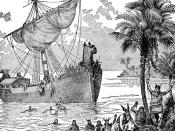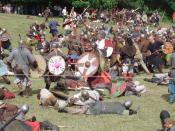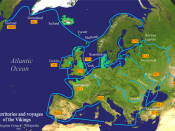Topic 10 - Raiders or traders? the Vikings: The last great wave of invasions for western Europe came with the Vikings. Who were they, where did they go and what did they want?
The term 'Viking' is as complex and ambiguous as trying to characterise 'the Vikings' themselves. According to the Oxford Dictionary of English Etymology this ambiguity is found in the origin of the term viking itself. Its general meaning is 'Scandinavian searover', but on closer inspection, it contains two meanings. Its first appearance is in the Icelandic form vikingr; vik, meaning creek, inlet, ingr, as in 'frequenter of inlets of the sea' . However, the Anglo-Frisian linguistic meaning of the word wick is "in the sense of 'camp', the formation of temporary encampments being a prominent feature of viking raids" . Many of these encampments over time became long-term settlements. Therefore, there is the polarity of 'seafarer/pirate/ raider' and 'settler/farmer/trader'.
The Reader's Encyclopedia places the focus on the 'raider' aspect of the Vikings - "A Norse pirate of about 18th-10th centuries AD; probably so called from Icelandic vig war, cognate with Latin vincere, to conquer" . It does, however, stress that the word is not connected with king. There were 'sea-kings' (not to be confused with Vikings) who were of royal blood and had small dominions on the coast; they engaged in Viking activities, i.e. seafaring/plundering expeditions. R.T. Farrell points out that,
"It is convenient to apply the term 'Viking' to all aspects of Scandinavian expansion in this period (9th century), including trade and settlement; but, whatever its much-disputed origins, its basic meaning seems to be 'sea-borne military adventurer'. An adventure does not need to be destructive, but it is obvious that the word has strong connotations of piracy, and 'pirate' is a very...


